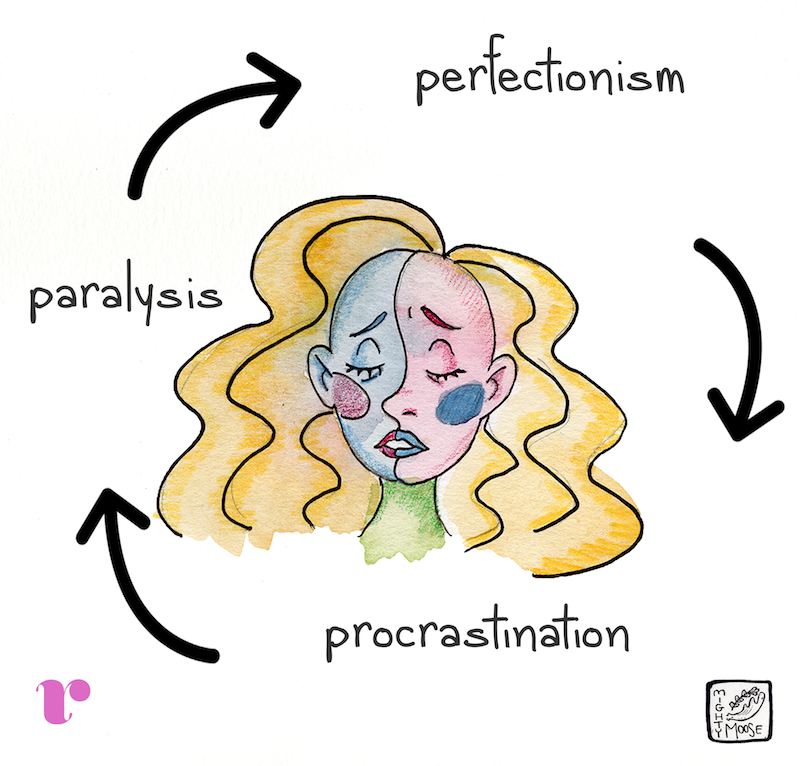
Perfectionism is exhausting. It steals your time, your energy, your joy, your life.
I have been writing this article in my head for three weeks. Every time I sat down to type out the words, I came up empty. I’ve sat in front of this computer for whole hours, staring at the blinking metronome of my cursor, trying and trying and trying to write something “good,” but failing every time.
I skipped a week of writing this column because I let the deadline fly right by me, all the while berating myself for being lazy, unproductive, and incompetent. Even this draft, the one I’m typing right now and hopefully publishing by Wednesday, is woefully late.
I’m experiencing paralysis about writing about paralysis.
I am no stranger to paralysis, and my guess is that neither are you. I bet this sort of scenario sounds familiar: you start a project determined to execute it perfectly. You avoid it until you can “do it right,” but then you don’t do it at all. You feel frozen, stuck, incapable. You are paralyzed by the fear that you will be bad at the thing you want to accomplish. Which, of course, makes it impossible to accomplish anything.
It's a never ending cycle: perfectionism, procrastination, paralysis.
At my best, I am an efficient and organized person. I thrive off of hard work and high pressure, always ambitious, always reaching for the next thing to do or make or achieve. I am productive and full of ideas. I take charge and take action. I keep a clean house and read at least a book a week.
At my worst, I am flighty and frazzled. I spend far more time thinking about how I want to do something than I do actually doing it. I doubt every choice I make, every thought that flits across my mind. I let my apartment get increasingly messy, even though I know how much I need a clean space in order to be happy. I just can’t confront the glaring imperfection of a sink full of dishes, baskets of dirty laundry.
I recede further and further inside of myself.
You Might Also Like: Apparently I Have A "Perfectionism Disorder"
I spend days at a time in bed, staring at the ceiling and thinking of all the things I could be doing but can’t because I know I would do them imperfectly. I lose countless hours to inner monologues filled with self-hatred and all-or-nothing thinking. I don’t read anything, instead preferring to slowly crush myself with the existential weight of knowing that I will never be able to Read All The Things.
For a very long time, I thought that I did this because I was lazy. I figured that if I just worked a little harder, tried a little more, then I would be able to accomplish the things I set out to do. Failing to do them was a failure of my character. It was because I was a bad person, or at least bad at being a person.
I told myself that I had to get my act together; I had to do all of these things so that I could prove I wasn’t the worthless piece of garbage I thought I was. When I inevitably cracked under that pressure, I took it as proof that I was a worthless piece of garbage.
If all of this sounds repetitive, that’s because it is. It’s a vicious, repetitive, monotonous cycle. It moves at breakneck speed, but also not at all. Experiencing it is the most damning case against perfectionism I have ever come across. Expecting perfection only leaves you with two options: do everything right on the very first try, or don’t even bother. Which is actually only one option, since 9 times out of 10, human beings don't do things right on the first try. Just look at French history, Cars 2, Robert Downey Jr.
"Do the work. Write the story. Wash your dishes. It will never be perfect, but that does not mean that it can’t be good."
When I was a junior in high school, I attended a summer arts program called CSSSA. I went for creative writing, and the whole month was a big struggle for me. I woke up every morning terrified of the day ahead of me, paralyzed by the fear that I would come to class with a bad draft. It eventually got so bad that I walked into my memoir class one day and tearfully told my teacher that I could not give him the draft I’d brought to the workshop. It was too awful. He asked me to bring it to a one-on-one conference so that we could discuss it. I spent the next five hours cringing at the thought of him reading even a single word of what I’d written.
When the meeting came, we sat at a table while he silently went over my work. He finished and looked up at me, then the ceiling, then the page. “I don’t know what it is that you’re so unhappy with” he said, sifting through the pages, “This looks like a really interesting idea.”
I struggled to reach for the words. “It’s… it’s just not what I wanted it to be. I tried to make it sound how it did in my head, and it didn’t.”
“I think the problem here isn’t the writing – it’s you. You’re expecting a product without respecting the process. I’m not interested in getting something perfect from you, and you shouldn’t be either. Just do the work. Write the story. And then write it again, as many times as you need to.”
I think about that meeting a lot, about the way it made this very column possible, about how much I still have left to learn from it. Four years later, I still find myself “stuck” on blank pages and bad drafts, terrified to move forward and risk writing something that I’m not proud of. But if I never take that risk, I’ll never make anything at all. The question of whether it’s any good is made irrelevant, because it won’t exist.
We are not all little Athenas — we do not sprout fully formed from our fathers’ heads with perfect careers, houses, and social lives. Instead, we come out as weird little alien babies with heads so big it takes a year before we can even walk, let alone write a good essay or keep a clean house. Mistakes are essential to human progress and personal development, so why do I keep telling myself I’m not allowed to make any? How can I ever break free of this vicious cycle when it renders me incapable of taking action?
But that’s not actually true, is it? Paralysis isn’t stopping me from taking action so much as it is taking up all my time and energy before I have the chance to do much else. Here’s the thing: perfectionism, even and especially when it prevents you from being productive, is a lot of really hard work. It is ten times harder to write this article out in my head than it is to just sit down and do it. I could wash a whole restaurant’s worth of dishes with the willpower it takes to avoid them and stare at them and think about what my mom would say if she saw them. Why waste time thinking about the books I’ll never read when I can use that time actually reading them?
Perfectionism is exhausting. It steals your time, your energy, your joy, your life.
Realizing that is half the battle. The rest involves a lot of mistakes and mishaps and bad drafts.
It’s the only advice that has worked so far: Do the work. Write the story. Wash your dishes. It will never be perfect, but that does not mean that it can’t be good.
Life is a lot better when you allow yourself to live it.
#OCDame is a weekly column about chronic mental illness by Jenni Berrett. While she’s no doctor or counselor by any means, she does have extensive experience in being batshit crazy — which she doesn't think is as bad a thing as the world would lead you to believe. Each week she puts that ongoing experience to good use by writing things that have been stuck inside her heart for too long in the hopes that they will help unstick somebody else’s heart, too.
Find more articles from OCDame by clicking here. You can also shoot Jenni an email (at any time and about any thing, just so long as you remember the whole aforementioned Not Being A Doctor situation) at jennib@ravishly.com.







